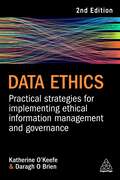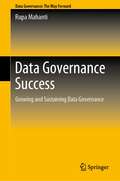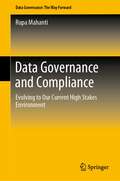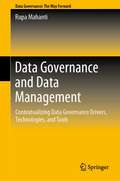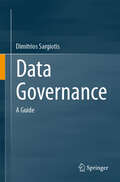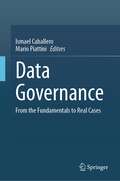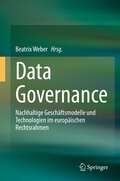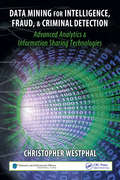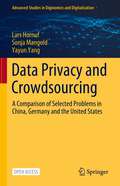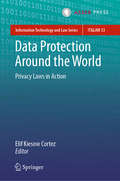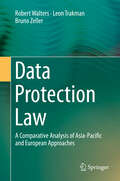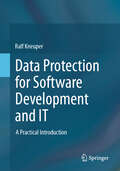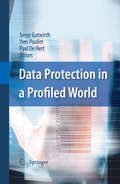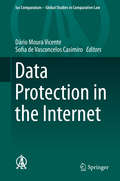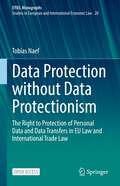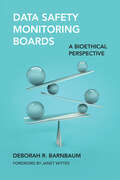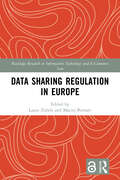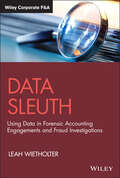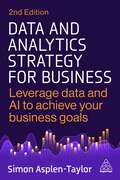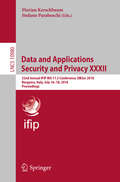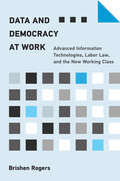- Table View
- List View
Data Ethics: Practical Strategies for Implementing Ethical Information Management and Governance
by Katherine O'Keefe Daragh O BrienData-gathering technology is more sophisticated than ever, as are the ethical standards for using this data. This second edition shows how to navigate this complex environment.Data Ethics provides a practical framework for the implementation of ethical principles into information management systems. It shows how to assess the types of ethical dilemmas organizations might face as they become more data-driven. This fully updated edition includes guidance on sustainability and environmental management and on how ethical frameworks can be standardized across cultures that have conflicting values. There is also discussion of data colonialism, the challenge of ethical trade-offs with ad-tech and analytics such as Covid-19 tracking systems and case studies on Smart Cities and Demings Principles.As the pace of developments in data-processing technology continues to increase, it is vital to capitalize on the opportunities this affords while ensuring that ethical standards and ideals are not compromised. Written by internationally regarded experts in the field, Data Ethics is the essential guide for students and practitioners to optimizing ethical data standards in organizations.
Data Governance Success: Growing and Sustaining Data Governance
by Rupa MahantiWhile good data is an enterprise asset, bad data is an enterprise liability. Data governance enables you to effectively and proactively manage data assets throughout the enterprise by providing guidance in the form of policies, standards, processes and rules and defining roles and responsibilities outlining who will do what, with respect to data. While implementing data governance is not rocket science, it is not a simple exercise. There is a lot confusion around what data governance is, and a lot of challenges in the implementation of data governance. Data governance is not a project or a one-off exercise but a journey that involves a significant amount of effort, time and investment and cultural change and a number of factors to take into consideration to achieve and sustain data governance success. Data Governance Success: Growing and Sustaining Data Governance is the third and final book in the Data Governance series and discusses the following:• Data governance perceptions and challenges • Key considerations when implementing data governance to achieve and sustain success• Strategy and data governance• Different data governance maturity frameworks• Data governance – people and process elements• Data governance metricsThis book shares the combined knowledge related to data and data governance that the author has gained over the years of working in different industrial and research programs and projects associated with data, processes, and technologies and unique perspectives of Thought Leaders and Data Experts through Interviews conducted. This book will be highly beneficial for IT students, academicians, information management and business professionals and researchers to enhance their knowledge to support and succeed in data governance implementations. This book is technology agnostic and contains a balance of concepts and examples and illustrations making it easy for the readers to understand and relate to their own specific data projects.
Data Governance and Compliance: Evolving to Our Current High Stakes Environment
by Rupa MahantiThis book sets the stage of the evolution of corporate governance, laws and regulations, other forms of governance, and the interaction between data governance and other corporate governance sub-disciplines. Given the continuously evolving and complex regulatory landscape and the growing number of laws and regulations, compliance is a widely discussed issue in the field of data. This book considers the cost of non-compliance bringing in examples from different industries of instances in which companies failed to comply with rules, regulations, and other legal obligations, and goes on to explain how data governance helps in avoiding such pitfalls.The first in a three-volume series on data governance, this book does not assume any prior or specialist knowledge in data governance and will be highly beneficial for IT, management and law students, academics, information management and business professionals, and researchers to enhance their knowledge and get guidance in managing their own data governance projects from a governance and compliance perspective.
Data Governance and Data Management: Contextualizing Data Governance Drivers, Technologies, and Tools
by Rupa MahantiThis book delves into the concept of data as a critical enterprise asset needed for informed decision making, compliance, regulatory reporting and insights into trends, behaviors, performance and patterns. With good data being key to staying ahead in a competitive market, enterprises capture and store exponential volumes of data. Considering the business impact of data, there needs to be adequate management around it to derive the best value. Data governance is one of the core data management related functions. However, it is often overlooked, misunderstood or confused with other terminologies and data management functions. Given the pervasiveness of data and the importance of data, this book provides comprehensive understanding of the business drivers for data governance and benefits of data governance, the interactions of data governance function with other data management functions and various components and aspects of data governance that can be facilitated by technology and tools, the distinction between data management tools and data governance tools, the readiness checks to perform before exploring the market to purchase a data governance tool, the different aspects that must be considered when comparing and selecting the appropriate data governance technologies and tools from large number of options available in the marketplace and the different market players that provide tools for supporting data governance. This book combines the data and data governance knowledge that the author has gained over years of working in different industrial and research programs and projects associated with data, processes and technologies with unique perspectives gained through interviews with thought leaders and data experts. This book is highly beneficial for IT students, academicians, information management and business professionals and researchers to enhance their knowledge and get guidance on implementing data governance in their own data initiatives.
Data Governance: A Guide
by Dimitrios SargiotisThis book is a comprehensive resource designed to demystify the complex world of data governance for professionals across various sectors. This guide provides in-depth insights, methodologies, and best practices to help organizations manage their data effectively and securely. It covers essential topics such as data quality, privacy, security, and management ensuring that readers gain a holistic understanding of how to establish and maintain a robust data governance framework. Through a blend of theoretical knowledge and practical applications, this book addresses the challenges and benefits of data governance, equipping readers with the tools needed to navigate the evolving data landscape. In addition to foundational principles, this book explores real-world case studies that illustrate the tangible benefits and common pitfalls of implementing data governance. Emerging trends and technologies, including artificial intelligence, machine learning, and blockchain are also examined to prepare readers for future developments in the field. Whether you are a seasoned data management professional or new to the discipline, this book serves as an invaluable resource for mastering the intricacies of data governance and leveraging data as a strategic asset for organizational success. This resourceful guide targets data management professionals, IT managers, Compliance officers, Data Stewards, Data Owners Data Governance Managers and more. Business leaders, business executives academic researchers, students focused on computer science in data-related fields will also find this book a useful resource.
Data Governance: From the Fundamentals to Real Cases
by Mario Piattini Ismael CaballeroThis book presents a set of models, methods, and techniques that allow the successful implementation of data governance (DG) in an organization and reports real experiences of data governance in different public and private sectors. To this end, this book is composed of two parts. Part I on “Data Governance Fundamentals” begins with an introduction to the concept of data governance that stresses that DG is not primarily focused on databases, clouds, or other technologies, but that the DG framework must be understood by business users, systems personnel, and the systems themselves alike. Next, chapter 2 addresses crucial topics for DG, such as the evolution of data management in organizations, data strategy and policies, and defensive and offensive approaches to data strategy. Chapter 3 then details the central role that human resources play in DG, analysing the key responsibilities of the different DG-related roles and boards, while chapter 4 discusses the most common barriers to DG in practice. Chapter 5 summarizes the paradigm shifts in DG from control to value creation. Subsequently chapter 6 explores the needs, characteristics and key functionalities of DG tools, before this part ends with a chapter on maturity models for data governance. Part II on “Data Governance Applied” consists of five chapters which review the situation of DG in different sectors and industries. Details about DG in the banking sector, public administration, insurance companies, healthcare and telecommunications each are presented in one chapter. The book is aimed at academics, researchers and practitioners (especially CIOs, Data Governors, or Data Stewards) involved in DG. It can also serve as a reference for courses on data governance in information systems.
Data Governance: Nachhaltige Geschäftsmodelle und Technologien im europäischen Rechtsrahmen
by Beatrix WeberData Governance kann in den Dimensionen Technik, Ökonomie, Nachhaltigkeit und Recht als Steuerung der Nutzung, des Teilens und der Weiterverwendung von Daten definiert werden. Der sich entwickelnde Rechtsrahmen der Europäischen Union zum Datenrecht, insbesondere der Data Governance Act, der Data Act, der Digital Markets Act sowie bereits bestehende Gesetze wie die Datenschutzgrundverordnung schaffen einen Ordnungsrahmen für Dateninhaber, Datennutzer und Datensubjekte. Daneben erfordert die ESG-Gesetzgebung in den Bereichen Nachhaltigkeit und Umweltschutz die rechtskonforme Erfassung und Nutzung von Daten. Vor diesem Hintergrund wird der Binnenmarkt für Daten als Produkte oder Dienstleistungen dauerhaft nur wachsen, wenn technische Innovationen und Standards eine nachhaltige, rechtskonforme, aber auch wertschöpfende Datennutzung für die Marktteilnehmer ermöglichen. Dieses Werk löst die Frage, wie ein ökonomischer Mehrwert durch die Nutzung von Daten erzeugt werden kann, der die aktuellen technischen Möglichkeiten, Ziele der Nachhaltigkeit und das rechtlich Zulässige verbindet.
Data Justice (Data Justice)
by Lina Dencik Arne Hintz Joanna Redden Emiliano Treré"The definitive book on the social, political, and economic dimensions of data." - Vincent Mosco, author of The Smart City in a Digital World "An essential handbook for those invested in reclaiming our digital space." - Payal Arora, author of The Next Billion Users and FemLab Co-Founder In an age of datafication, the systematic collection, analysis and exploitation of data impacts all aspects of our social lives. Crucially, there are winners and losers in this. From access to services, to the risk of being wrongfully targeted, to our very understanding of the social world and what we think matters in it. Data Justice is a cutting-edge exploration of the power relations that lay at the heart of our datafied lives. It outlines the intricate relationship between datafication and social justice, exploring how societies are, will, and should be affected by data-driven technology and automation. From data capitalism and data colonialism, to data harms and data activism – this book is an expert guide to the debates central to understanding the injustices of life in a datafied society. It is also an urgent and impassioned call to challenge and reimagine these injustices. To work collectively to achieve a fairer and more just future. Data Justice is an essential resource for anyone working and studying across critical data studies, and anyone interested in the social consequences of big data, smart technology and AI. Dr Lina Dencik, Dr Arne Hintz, Dr Joanna Redden and Dr Emiliano Treré are co-Directors of the Data Justice Lab at Cardiff University.
Data Justice (Data Justice)
by Lina Dencik Arne Hintz Joanna Redden Emiliano Treré"The definitive book on the social, political, and economic dimensions of data." - Vincent Mosco, author of The Smart City in a Digital World "An essential handbook for those invested in reclaiming our digital space." - Payal Arora, author of The Next Billion Users and FemLab Co-Founder In an age of datafication, the systematic collection, analysis and exploitation of data impacts all aspects of our social lives. Crucially, there are winners and losers in this. From access to services, to the risk of being wrongfully targeted, to our very understanding of the social world and what we think matters in it. Data Justice is a cutting-edge exploration of the power relations that lay at the heart of our datafied lives. It outlines the intricate relationship between datafication and social justice, exploring how societies are, will, and should be affected by data-driven technology and automation. From data capitalism and data colonialism, to data harms and data activism – this book is an expert guide to the debates central to understanding the injustices of life in a datafied society. It is also an urgent and impassioned call to challenge and reimagine these injustices. To work collectively to achieve a fairer and more just future. Data Justice is an essential resource for anyone working and studying across critical data studies, and anyone interested in the social consequences of big data, smart technology and AI. Dr Lina Dencik, Dr Arne Hintz, Dr Joanna Redden and Dr Emiliano Treré are co-Directors of the Data Justice Lab at Cardiff University.
Data Mining for Intelligence, Fraud & Criminal Detection: Advanced Analytics & Information Sharing Technologies
by Christopher WestphalIn 2004, the Government Accountability Office provided a report detailing approximately 200 government-based data-mining projects. While there is comfort in knowing that there are many effective systems, that comfort isn‘t worth much unless we can determine that these systems are being effectively and responsibly employed.Written by one of the most
Data Privacy and Crowdsourcing: A Comparison of Selected Problems in China, Germany and the United States (Advanced Studies in Diginomics and Digitalization)
by Lars Hornuf Sonja Mangold Yayun YangThis open access book describes the most important legal sources and principles of data privacy and data protection in China, Germany and the United States. The authors collected privacy statements from more than 400 crowdsourcing platforms, which allowed them to empirically evaluate their data privacy and data protection practices. The book compares the practices in the three countries and develops empirically-grounded policy recommendations.A profound analysis on workers´ privacy in new forms of work in China, Germany, and the United States. Prof. Dr. Wolfgang Däubler, University of BremenThis is a comprehensive and timely book for legal and business scholars as well as practitioners, especially with the increasingly important role of raw data in machine learning and artificial intelligence.Professor Mingfeng Lin, Georgia Institute of Technology
Data Privacy and GDPR Handbook
by Sanjay SharmaThe definitive guide for ensuring data privacy and GDPR compliance Privacy regulation is increasingly rigorous around the world and has become a serious concern for senior management of companies regardless of industry, size, scope, and geographic area. The Global Data Protection Regulation (GDPR) imposes complex, elaborate, and stringent requirements for any organization or individuals conducting business in the European Union (EU) and the European Economic Area (EEA)—while also addressing the export of personal data outside of the EU and EEA. This recently-enacted law allows the imposition of fines of up to 5% of global revenue for privacy and data protection violations. Despite the massive potential for steep fines and regulatory penalties, there is a distressing lack of awareness of the GDPR within the business community. A recent survey conducted in the UK suggests that only 40% of firms are even aware of the new law and their responsibilities to maintain compliance. The Data Privacy and GDPR Handbook helps organizations strictly adhere to data privacy laws in the EU, the USA, and governments around the world. This authoritative and comprehensive guide includes the history and foundation of data privacy, the framework for ensuring data privacy across major global jurisdictions, a detailed framework for complying with the GDPR, and perspectives on the future of data collection and privacy practices. Comply with the latest data privacy regulations in the EU, EEA, US, and others Avoid hefty fines, damage to your reputation, and losing your customers Keep pace with the latest privacy policies, guidelines, and legislation Understand the framework necessary to ensure data privacy today and gain insights on future privacy practices The Data Privacy and GDPR Handbook is an indispensable resource for Chief Data Officers, Chief Technology Officers, legal counsel, C-Level Executives, regulators and legislators, data privacy consultants, compliance officers, and audit managers.
Data Protection Around the World: Privacy Laws in Action (Information Technology and Law Series #33)
by Elif Kiesow CortezThis book provides a snapshot of privacy laws and practices from a varied set of jurisdictions in order to offer guidance on national and international contemporary issues regarding the processing of personal data and serves as an up-to-date resource on the applications and practice-relevant examples of data protection laws in different countries.Privacy violations emerging at an ever-increasing rate, due to evolving technology and new lifestyles linked to an intensified online presence of ever more individuals, required the design of a novel data protection and privacy regulation. The EU General Data Protection Regulation (GDPR) stands as an example of a regulatory response to these demands.The authors included in this book offer an in-depth analysis of the national data protection legislation of various countries across different continents, not only including country-specific details but also comparing the idiosyncratic characteristics of these national privacy laws to the GDPR. Valuable comparative information on data protection regulations around the world is thus provided in one concise volume.Due to the variety of jurisdictions covered and the practical examples focused on, both academics and legal practitioners will find this book especially useful, while for compliance practitioners it can serve as a guide regarding transnational data transfers.Elif Kiesow Cortez is Senior Lecturer at the International and European Law Program at The Hague University of Applied Sciences in The Netherlands.
Data Protection Compliance in the UK
by Rosemary Jay Jenna ClarkeOrganisations now face much stiffer penalties for breaching the Data Protection Act, which makes this pocket guide more valuable than ever!Your company holds personal information about your customers in electronic form. Almost certainly, you will also keep records on your staff in your computer system. In the digital age, managing personal information has become a key organisational challenge. For legal reasons, everyone has to understand the proper way to handle this personal data. ComplianceYour business needs to operate in compliance with the Data Protection Act. This means your company has to take the right steps towards secure management of personal digital information. Under the Data Protection Act, some faults are treated as criminal offences. Where failure to comply is the fault of a manager, the manager can be prosecuted along with the company. A tougher regulatory environmentKnowingly, or recklessly, obtaining or disclosing personal data is an offence under Section 55 of the Data Protection Act. In 2009, the Coroners and Justice Act amended the DPA to give the Information Commissioner the power to carry out compulsory assessments of government departments. This year, the government has further tightened the enforcement regime for the DPA. On 6 April 2010, tougher penalties came into effect, including custodial sentences for deliberate or careless disclosure of personal data. Deliberate, or reckless, disclosure of personal data by your staff will also put you in the firing line as their employer. The Information Commissioner''s Office has acquired new powers to fine companies up to £500,000 for serious contraventions of the Data Protection Act. This pocket guide gives you a clear description of the Data Protection Act, outlining its terms and explaining its requirements. It is essential reading if you have a responsibility for the security of personal data, especially if you are a director, a manager or an IT professional. The pocket guide includes handy good practice tips for staff. The easy-to-follow checklist tells you the practical steps you should be taking in order to comply with the Data Protection Act. Benefits to business include: * Avoid expensive litigation Failure to comply with the Data Protection Act can lead to a heavy fine, as well as complaints and reputational damage. Use this book to help your company avoid embarrassing disputes and costly litigation. * Avoid illegal monitoring and interception There are good reasons why you might want to listen to customer calls (monitoring) or to record them (interception). Use this book to ensure that you monitor and intercept calls and e-mails in a way that is legal. * Understand transfer of data overseas To improve customer service or streamline operations, your company may wish to transfer personal digital information overseas (offshoring). This book advises you on when it is legal to do this. It offers you guidance on transfer of data outside the European Economic Area, and on the US-EU Safe Harbor Agreement. * Handle electronic marketing properly You need to understand the special rules that concern e-mail marketing. Use this book to make sure that your online marketing campaigns are being run in a way that is legal. Data Protection Compliance in the UK has been published as an inexpensive and easily read introduction for any employee required to support compliance with the DPA. It: * Outlines UK and EU data protection regulations; * Describes the rights of individuals; * Explains the security obligations of organizations; * Addresses topics including o IT monitoring and interception, o enforcement provisions and o penalties for non-compliance. Reputational risksA survey conducted by IT Governance has shown that only around half of those employees who handle personal information have been trained in their Data Protection Act responsibilities. And yet failure to comply with the Data Protection Act can have damaging consequences. The scandal at T-Mobile has highlighted the need for businesses to tighten up their data securi...
Data Protection Law: A Comparative Analysis of Asia-Pacific and European Approaches
by Robert Walters Leon Trakman Bruno ZellerThis book provides a comparison and practical guide for academics, students, and the business community of the current data protection laws in selected Asia Pacific countries (Australia, India, Indonesia, Japan Malaysia, Singapore, Thailand) and the European Union.The book shows how over the past three decades the range of economic, political, and social activities that have moved to the internet has increased significantly. This technological transformation has resulted in the collection of personal data, its use and storage across international boundaries at a rate that governments have been unable to keep pace. The book highlights challenges and potential solutions related to data protection issues arising from cross-border problems in which personal data is being considered as intellectual property, within transnational contracts and in anti-trust law. The book also discusses the emerging challenges in protecting personal data and promoting cyber security. The book provides a deeper understanding of the legal risks and frameworks associated with data protection law for local, regional and global academics, students, businesses, industries, legal profession and individuals.
Data Protection for Software Development and IT: A Practical Introduction
by Ralf KneuperThis book introduces data protection, i.e. the protection of individuals from misuse of their personal data. It provides a special focus on the direct impact on software development, e.g. in the form of functional requirements for software systems resulting from data protection. Chapter 1 provides an initial overview of the basic concepts of data protection and its legal foundations. Chapter 2 then delves deeper into the European General Data Protection Regulation (GDPR), covering in particular its basic concepts, terminology and requirements. Next, the specific implementation and interpretation of GDPR requirements in software and IT are dealt with, starting in chapter 3 with the principles of data protection defined in GDPR and the rights of data subjects in chapter 4. Chapter 5 discusses data transfer between organizations, including the relevant constellations (e.g. through various service providers), the legal framework and its practical implementation. Subsequently, chapter 6 changes the view from individual regulations and their implementation to technical and organizational design of data protection, including its embedding in the software life cycle, while chapter 7 provides an overview of information security and its aspects relevant to data protection. Eventually, chapter 8 deals with data protection for organizations as they are data subjects themselves. The appendices contain the most important excerpts from the Charter of Fundamental Rights of the EU and GDPR in this context, a collection of links to relevant laws and supervisory authorities, as well as a glossary of the most important terms used. The book’s target groups include software developers, IT consultants, requirements analysts, IT operations personnel and project managers in IT projects, but also data protection managers and data protection officers in the context of software development and IT.
Data Protection in a Profiled World
by Paul De Hert Yves Poullet Serge GutwirthOne of the most challenging issues facing our current information society is the accelerating accumulation of data trails in transactional and communication systems, which may be used not only to profile the behaviour of individuals for commercial, marketing and law enforcement purposes, but also to locate and follow things and actions. Data mining, convergence, interoperability, ever- increasing computer capacities and the extreme miniaturisation of the hardware are all elements which contribute to a major contemporary challenge: the profiled world. This interdisciplinary volume offers twenty contributions that delve deeper into some of the complex but urgent questions that this profiled world addresses to data protection and privacy. The chapters of this volume were all presented at the second Conference on Privacy and Data Protection (CPDP2009) held in Brussels in January 2009 (www.cpdpconferences.org). The yearly CPDP conferences aim to become Europe's most important meeting where academics, practitioners, policy-makers and activists come together to exchange ideas and discuss emerging issues in information technology, privacy and data protection and law. This volume reflects the richness of the conference, containing chapters by leading lawyers, policymakers, computer, technology assessment and social scientists. The chapters cover generic themes such as the evolution of a new generation of data protection laws and the constitutionalisation of data protection and more specific issues like security breaches, unsolicited adjustments, social networks, surveillance and electronic voting. This book not only offers a very close and timely look on the state of data protection and privacy in our profiled world, but it also explores and invents ways to make sure this world remains a world we want to live in.
Data Protection in the Internet (Ius Comparatum - Global Studies in Comparative Law #38)
by Dário Moura Vicente Sofia de Vasconcelos CasimiroThis book identifies and explains the different national approaches to data protection – the legal regulation of the collection, storage, transmission and use of information concerning identified or identifiable individuals – and determines the extent to which they could be harmonised in the foreseeable future. In recent years, data protection has become a major concern in many countries, as well as at supranational and international levels. In fact, the emergence of computing technologies that allow lower-cost processing of increasing amounts of information, associated with the advent and exponential use of the Internet and other communication networks and the widespread liberalization of the trans-border flow of information have enabled the large-scale collection and processing of personal data, not only for scientific or commercial uses, but also for political uses. A growing number of governmental and private organizations now possess and use data processing in order to determine, predict and influence individual behavior in all fields of human activity. This inevitably entails new risks, from the perspective of individual privacy, but also other fundamental rights, such as the right not to be discriminated against, fair competition between commercial enterprises and the proper functioning of democratic institutions. These phenomena have not been ignored from a legal point of view: at the national, supranational and international levels, an increasing number of regulatory instruments – including the European Union’s General Data Protection Regulation applicable as of 25 May 2018 – have been adopted with the purpose of preventing personal data misuse. Nevertheless, distinct national approaches still prevail in this domain, notably those that separate the comprehensive and detailed protective rules adopted in Europe since the 1995 Directive on the processing of personal data from the more fragmented and liberal attitude of American courts and legislators in this respect. In a globalized world, in which personal data can instantly circulate and be used simultaneously in communications networks that are ubiquitous by nature, these different national and regional approaches are a major source of legal conflict.
Data Protection without Data Protectionism: The Right to Protection of Personal Data and Data Transfers in EU Law and International Trade Law (European Yearbook of International Economic Law #28)
by Tobias NaefThis open access book offers a new account on the legal conflict between privacy and trade in the digital sphere. It develops a fundamental rights theory with a new right to continuous protection of personal data and explores the room for the application of this new right in trade law. Replicable legal analysis and practical solutions show the way to deal with cross-border data flows without violating fundamental rights and trade law principles. The interplay of privacy and trade became a topic of worldwide attention in the wake of Edward Snowden’s revelations concerning US mass surveillance. Based on claims brought forward by the activist Maximilian Schrems, the ECJ passed down two high-profile rulings restricting EU-US data flows. Personal data is relevant for a wide range of services that are supplied across borders and restrictions on data flows therefore have an impact on the trade with such services. After the two rulings by the ECJ, it is less clear then ever how privacy protection and trade can be brought together on an international scale. Although it was widely understood that the legal dispute over EU-US data flows concerns the broad application of EU data protection law, it has never been fully explored just how far the EU’s requirements for the protection of digital rights go and what this means beyond EU-US data flows. This book shows how the international effects of EU data protection law are rooted in the EU Charter of Fundamental Rights and that the architecture of EU law demands that the Charter as primary EU law takes precedence over international law. The book sets out to solve the problem of how the EU legal data transfer regime must be designed to implement the EU’s extraterritorial fundamental rights requirements without violating the principles of the WTO’s law on services. It also addresses current developments in international trade law – the conclusion of comprehensive trade agreements – and offers suggestion for the design of data flow clauses that accommodate privacy and trade.
Data Safety Monitoring Boards: A Bioethical Perspective (Basic Bioethics)
by Deborah R. BarnbaumA critical and underexplored area of bioethics—ethical issues that emerge from the data monitoring of clinical trials.Data Safety Monitoring Boards explores ethical issues confronted by data safety monitoring boards, or DSMBs, overseeing large randomized clinical trials. DSMBs meet on a regular basis to ensure that the expected benefits of a study continue to outweigh its risks and that side effects are monitored. They are empowered to recommend to study sponsors that studies be halted if ethical protections fail.Written by bioethicist Deborah Barnbaum, who has served as a clinical ethicist and patient advocate on several DSMBs for the National Institutes of Health since 2006, this book combines compelling narratives about clinical trials, the ethical quandaries that emerge when overseeing those studies, and the theoretical considerations that guide the practices of DSMBs.
Data Sharing Regulation in Europe (Routledge Research in Information Technology and E-Commerce Law)
by Laura Zoboli and Maciej BernattThis book provides a comprehensive examination of data sharing within the EU, exploring the regulatory challenges and opportunities created by EU frameworks and policies.As data becomes a critical resource across sectors, EU regulators, policymakers and scholars face the urgent task of crafting frameworks that support data sharing while ensuring fairness, competition and protection of personal data. Through its chapters, the book adopts a holistic approach, analyzing data sharing from the perspectives of EU law, intellectual property, competition law, data protection and governance. It addresses the impact of recent EU legislation — including the Digital Markets Act (DMA), Digital Services Act (DSA), Data Governance Act and Data Act — on enabling or limiting data-sharing practices, particularly in the private sector. Each chapter offers policy recommendations and insights, collectively building a robust theoretical framework for responsible data sharing.This book serves as a valuable resource for researchers, practitioners and students of EU law, competition law, data protection, intellectual property and governance, offering timely insights and a nuanced exploration of the evolving EU data-sharing landscape.
Data Sleuth: Using Data in Forensic Accounting Engagements and Fraud Investigations (Wiley Corporate F&A)
by Leah WietholterStraightforward, practical guidance for working fraud examiners and forensic accountants In Data Sleuth: Using Data in Forensic Accounting Engagements and Fraud Investigations, certified fraud examiner, former FBI support employee, private investigator, and certified public accountant Leah Wietholter delivers a step-by-step guide to financial investigation that can be applied to almost any forensic accounting use-case. The book emphasizes the use of best evidence as you work through problem-solving data analysis techniques that address the common challenge of imperfect and incomplete information. The accomplished author bridges the gap between modern fraud investigation theory and practical applications and processes necessary for working practitioners. She also provides: Access to a complimentary website with supplementary resources, including a Fraud Detection Worksheet and case planning template Strategies for systematically applying the Data Sleuth® framework to streamline and grow your practice Methods and techniques to improve the quality of your work productData Sleuth is an indispensable, hands-on resource for practicing and aspiring fraud examiners and investigators, accountants, and auditors. It’s a one-of-a-kind book that puts a practical blueprint to effective financial investigation in the palm of your hand.
Data and Analytics Strategy for Business: Leverage Data and AI to Achieve Your Business Goals
by Simon Asplen-TaylorData and AI present a tremendous opportunity to improve business performance by increasing operational efficiency, revenues and customer satisfaction. An effective data strategy leveraging the power of AI allows businesses to create a competitive advantage.Data and Analytics Strategy for Business is a practical guide for business, technology and data leaders building a data, analytics and AI strategy for their organization. Starting by identifying the value you can obtain from data, analytics and AI, this book shows you how to maximise that value to support your organization's goals and mission. It covers the importance of having high quality data to generate trust, getting the whole organization on board as well as all the other essential elements required to complete your strategy. This book provides the keys to using data to drive improved business results.Incorporating the latest developments in AI, this new edition of Data and Analytics Strategy for Business shows how leaders can use AI right away to get value from their existing strategy. It provides practical guidance and recommendations for implementing AI and machine learning to maximize performance. Filled with real-world examples from organizations including Tesco and Facebook, this book is a step-by-step guide to designing and implementing a results-driven data strategy.
Data and Applications Security and Privacy XXXII: 32nd Annual IFIP WG 11.3 Conference, DBSec 2018, Bergamo, Italy, July 16–18, 2018, Proceedings (Lecture Notes in Computer Science #10980)
by Florian Kerschbaum Stefano ParaboschiThis book constitutes the refereed proceedings of the 32nd Annual IFIP WG 11.3 International Working Conference on Data and Applications Security and Privacy, DBSec 2018, held in Bergamo, Italy, in July 2018. The 16 full papers and 5 short papers presented were carefully reviewed and selected from 50 submissions. The papers present high-quality original research from academia, industry, and government on theoretical and practical aspects of information security. They are organized in topical sections on administration, access control policies, privacy-preserving access and computation, integrity and user interaction, security analysis and private evaluation, fixing vulnerabilities, and networked systems.
Data and Democracy at Work: Advanced Information Technologies, Labor Law, and the New Working Class
by Brishen RogersAn exploration of how major companies have used advanced information technologies to limit worker power, and how labor law reform could reverse that trend.As our economy has shifted away from industrial production and service industries have become dominant, many of the nation's largest employers are now in fields like retail, food service, logistics, and hospitality. These companies have turned to data-driven surveillance technologies that operate over a vast distance, enabling cheaper oversight of massive numbers of workers. Data and Democracy at Work argues that companies often use new data-driven technologies as a power resource—or even a tool of class domination—and that our labor laws allow them to do so.Employers have established broad rights to use technology to gather data on workers and their performance, to exclude others from accessing that data, and to use that data to refine their managerial strategies. Through these means, companies have suppressed workers' ability to organize and unionize, thereby driving down wages and eroding working conditions.Labor law today encourages employer dominance in many ways—but labor law can also be reformed to become a tool for increased equity. The COVID-19 pandemic and subsequent Great Resignation have indicated an increased political mobilization of the so-called essential workers of the pandemic, many of them service industry workers. This book describes the necessary legal reforms to increase workers' associational power and democratize workplace data, establishing more balanced relationships between workers and employers and ensuring a brighter and more equitable future for us all.
